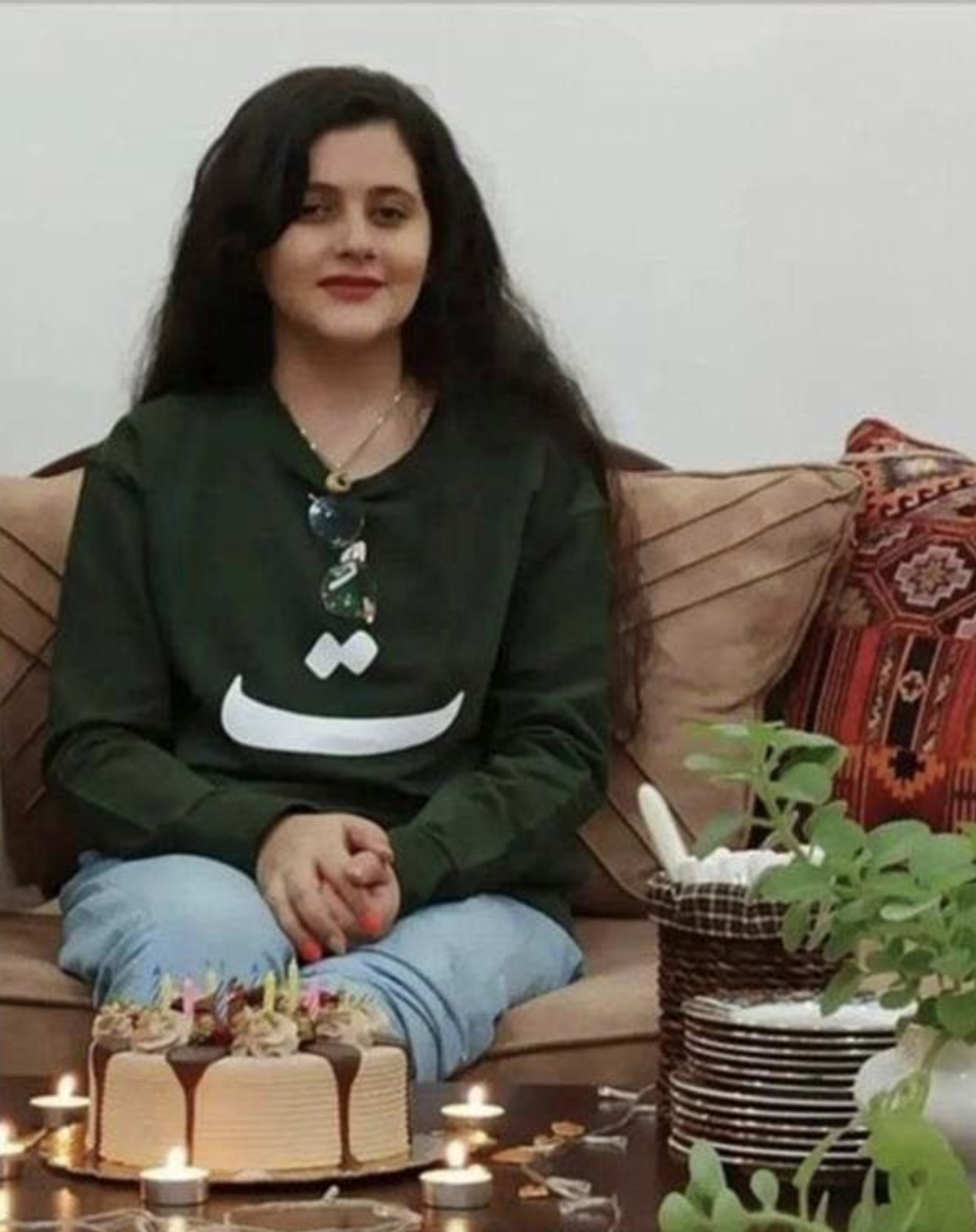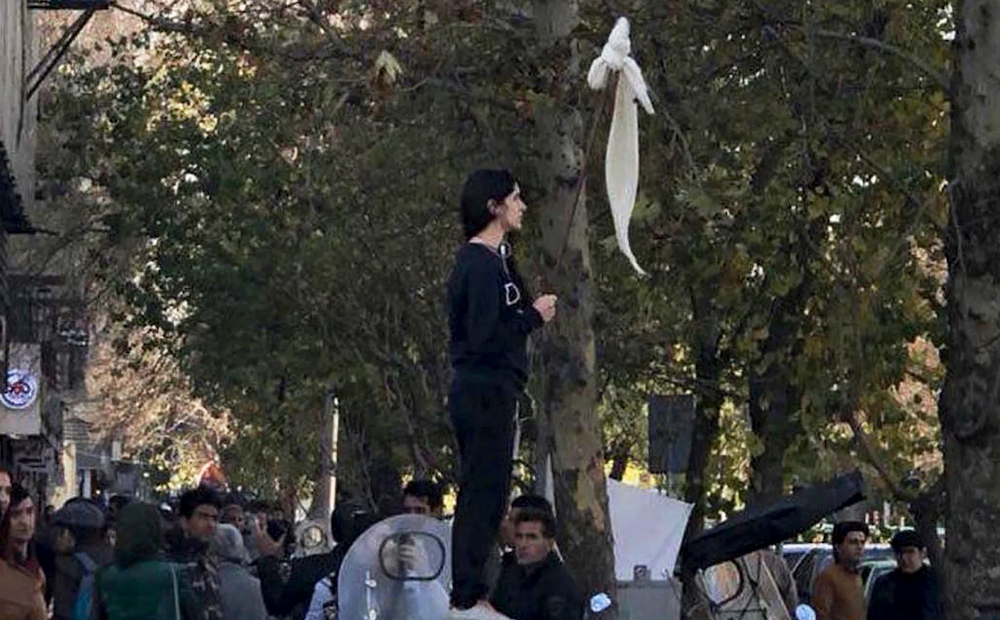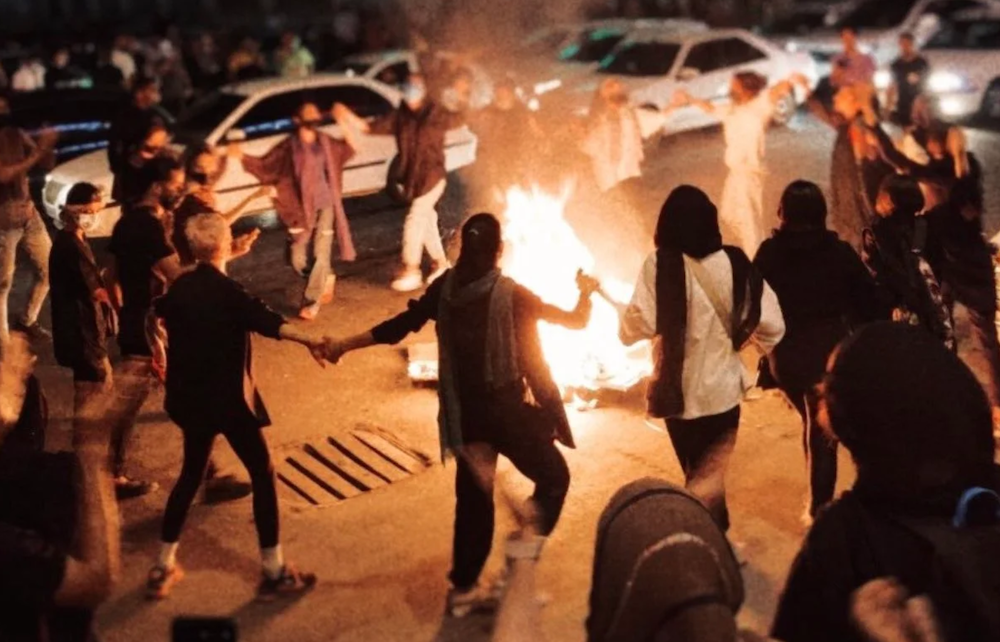When Mahsa-Jina’s revolution started, I was continents away from Iran, so I decided to write a piece about the shining body of this revolution every day. Today, more than two hundred days have passed, and we are still carrying on with this revolutionary movement, a resurrection through the three words Woman Life Freedom. This unpredictable revolution of ours: One day it is proud and one day tired; one day it is sleepy and the other lively; one day it is drunken and wild and the other desperate; one day it is unified and the other confused; exactly like the people we are, exactly like the Iran inside us, which we drag with us like violet flowers across other lands and waters and skies and seas and deserts1.
Woman Life Freedom: October 16, 2022

Watching your young life, Mahsa-Jina dear, your beautiful body fighting for breath, then departing this world. All of Iran left to reckon with your dying body, for Woman, for Life, and for Freedom. Your destiny was tied to that of the old body of Iran, but no one knew this beforehand. On a hot summer day, you got on a bus and traveled from a high-altitude, mountainous city to the capital, Tehran. You came up the stairs of the Haghani subway station, and with you the life of the whole nation of Iran came up its throat, leaving its body. Your legs, those stairs, that endless trip, they all came to an end. The way your mother, watching your lifeless body, became one with the blossoms of your life in your grave, in your tomb, in the cold soil, has multiplied all around the world. Today the world stands, holding your life in its hand. Faced with this hurricane of events, you are multiplied, and your name is loudly called from every corner of the world.
And today, a potion made with hair and blood has flowed into our veins; our once listless “if only”s have come to life, their hearts now beating in our hands. I’ve heard it’s your birthday today. You were supposed to turn twenty-three, but instead you planted the two “two”s of your age in our hands forever. Look at our long, slim fingers as they hold these “two”s above our heads in the shape of Vs. Look at how they have become the secret to our victory. Your name, “Mahsa-Jina,” has become branches of life in the black depth of the night. The beautiful Iran is your other name, Mahsa-Jina dear.
On your tombstone, they wrote in Kurdish, “ ژینا گیان تو نامری ناوت ئه بیته ره مز ,” which in Persian is “ژینا جان تو نمیمیری، نامت رمز میشود. ,” which in English is “Jina dear, you will not die. Your name will become a symbol.”
Woman Life Freedom: November 25, 2022

It’s time for rebellion. Time for reparation. Time for revolution. They have risen for you, Mahsa-Jina dear, you who were like the moon. Your blood has warmed up their veins; rivers of blood are boiling and converging. I’m talking about your sisters, Mahsa-Jina. Your sisters have conquered the city for a while now.
A few years ago, when no one was paying attention, one of them took a big slice of the women’s revolutionary movement for herself by standing tall on top of an electricity box in Enghelab2 Street, breaking out of the male history of our land. A man brought her down from the top and tried to hide her once again in the history of closets and seraglios. A history crowded with men making pacts, men imprisoned in forts, men conquering, men executed by hanging, men winning wars, and . . . In this history, standing on top of an iron box, on a platform only slightly higher than the ground, is considered an epic, heroic act. It means playing a silent role to scrape off a corner of the dominant, unquestioned history made by men.
Again and again, men make many attempts to push women back into the corners of history, but little by little, they conquer all the unreachable platforms of the city. Women whose share of history has been devouring the water and bread of modernity cannot burp up backwardness. Men do all they can, but they cannot reach the rocky platforms to pull the women down. Men do what they can, but the archer women, like lightning, pull their bows and shoot their arrows, and the men are left behind.
Women break out of the labyrinths of history, take their bodies back piece by piece. They awaken their hair from a long winter sleep. They take back their blood. They surpass their fears and shame from their bodies’ regular monthly event and turn even their menstrual blood into an ambitious revolutionary act, taking their winged feminine pads out of the old rotten cage of black plastic bags and taping them over surveillance cameras to prevent more bloodshed.
And they are not just taking back pieces of their bodies. Women are also taking back their names. The father of Mohammad Hassanzadeh, who was executed, said at his son’s grave that before, when anyone wanted to say someone was truly human, zealous, honorable, they would say they were a real man, but now they should say they are a woman.
Women stand, and stand, and stand. They stand on top of platforms. They stand in the middle of the square. They conquer platforms, streets, cities, roads. They pave the way for others. They push through the night. They rush toward the sun. They open the streets of the city to life, to freedom. Like the two women who, on the night when their Hossein3, our Hossein, was being rushed to the hospital, broke the iron bars in the middle of the highway and cleared their way to the hospital. These two women are the living symbols of Woman Life Freedom.
She who stood on that electricity box on a regular day was one of these women too; one of your sisters, one of our sisters. A woman who had succeeded in escaping the thick pages of male history tooth and nail, with open wounds and swollen wens, lit up a corner of the city on one of Tehran’s dusty, polluted days when you could barely see, and left. She was called Vida4, wearing black clothes and holding a white scarf raised on a stick. Like a soldier standing tall with a white flag of ceasefire and peace. She was not the only one. Throughout history, all over the world, she has had sisters, young and fresh, standing tall. Like Natalya Gorbanevskaya, the thirty-three-year-old Russian poet who on August 25, 1968, stood in Moscow’s Red Square under the midday sun to protest the Soviet invasion of Czechoslovakia. She said “no” and conquered the square. On that day, seven others joined her, only to be destined to a forced labor camp, exile, and imprisonment. And Natalya herself was sentenced to a lifelong confinement in an asylum (though she was released a few years later).
The following year, seventy protesters gathered in Moscow’s Red Square, and the year after, seven hundred people, and the years after, seven thousand, and seventy thousand, and so on. Carts and wagons and their builders and their drivers will all one day be gone, but the one who conquers—even if for a quick moment, even if in a heart-rending event—will remain the one and only. She will be the one standing on top of high places, platforms, and rocks, standing tall amidst all the commotion, to nudge at forgetfulness and invite us to see the most spectacular scene: the whole world contained in the grains of sand that we are.
Who is she? She is not born a mythological figure or a hero. She turns herself into one, into a moment of light. She is faceless and simple. She walks past us in the streets every day. We have watched her every day. We have looked into her eyes from a distance, and she has pulled herself out of the long line of the faceless and the nameless. She is the woman who calls to the man standing on the side of a demonstration, simply watching the protesters go by, and tells him, “Sir, don’t stand there. Sir, come join us.” She is the woman who breaks the iron bars in the middle of the highway and clears her way to the hospital, to her son Hossein. The woman who conquers the platforms and squares and rocks and high places one after another. The woman who reaches her hand into the black, outdated plastic bag containing her pads, throws away retrograde mindsets, and decides how to use what is inside to stop further bleeding. The woman who shouts to invite others to fight while she is held in the grip of the tyrant Zahhak5 of her time.
Woman Life Freedom: December 24, 2022

One hundred days have passed since the day the breeze interweaved your hair with ours, since the day the Saba wind wove through the story of your hair. Since that day, each moment, a new messenger, young and full of life, has come forward and pulled at our hearts and souls. In the past hundred days, sometimes we have moved toward the city of survival and sometimes toward the plain of annihilation. Sometimes our hearts and our homes have burned with heavy sorrows. Sometimes we have burned like esfand and incense in the firebox of our hearts. Sometimes we have seen the day of resurrection; sometimes the Joseph of all virtues, tall and beautiful. Sometimes we have woken up from our dreams, drunk and heartbroken, asking the dawn breeze, “Where is the resting place of my beloved?”
Sometimes we ripped our clothes apart, sang songs, and held bottles of wine in hand6, walking in the luminous sun, joyous and jubilant over our unity, over our dance in the middle of the square.
Sometimes our eyes brightened on seeing the beauty of humorous, playful wanderers in the city of chaos. Sometimes we sat down, our hearts barely showing signs of life7. Sometimes, restless and bitter, we whispered under our breath, “We hoped friends would have our backs, but how wrong we were in hoping such hopeless hopes.”8
Now a hundred days have passed since this: “A hundred cities have been informed: Oh, you distressed people, the one sleeping has been awakened. Do not stop until daylight has arrived. Like a candle throwing light, do not stop until daylight has arrived.” 9
1. Reference to a lyric line by the late Iranian singer Farhad: “Wishing one could carry one’s homeland with themselves as if it were violet flowers.”↩
2. Enghelab in Persian means Revolution.↩
3. Hossein Ronaghi Maleki, Iranian human rights activist↩
4. Vida Movahed, Iranian human rights activist↩
5. An evil figure in classical Persian mythology. Currently used in reference to tyrants and evil leaders, especially to the Islamic Republic leader, Ali Khamenei↩
6. Reference to a line of a ghazal by Hafez↩
7. Reference to a line of a ghazal by Hafez↩
8. Reference to a line of a ghazal by Hafez↩
9. Reference to a line of a ghazal by Mowlana Rumi↩
© 2022 by Razieh Mehdizadeh. By arrangement with the author. Translation © 2023 by Poupeh Missaghi. All rights reserved.











